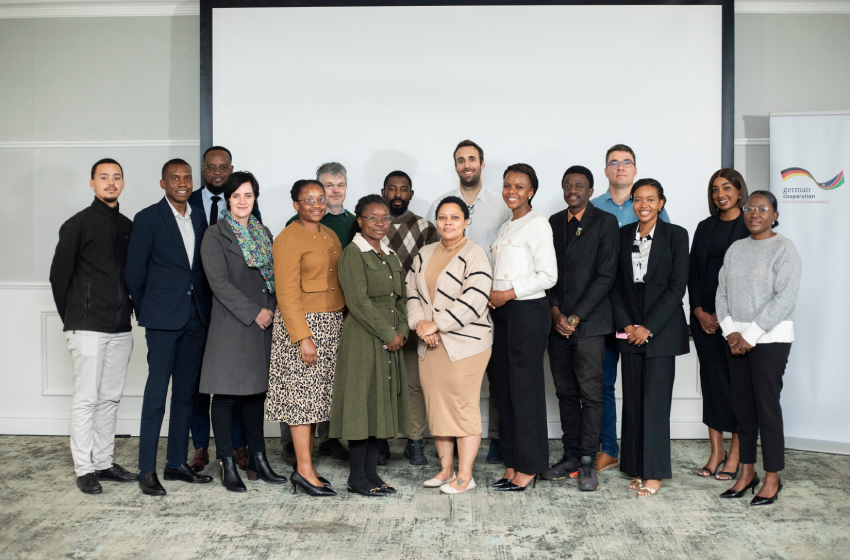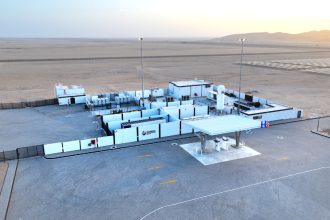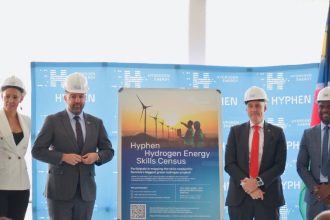On 13 May 2025, Namibia marked a significant step toward climate-smart trade with the European Union (EU) by hosting an important workshop on the Carbon Border Adjustment Mechanism (CBAM).
Organised by GIZ Namibia’s H2Uppp Project, in partnership with the Namibia Green Hydrogen Association (NamGHA), and with the technical expertise of Antonio Adolfo Fernández Rodríguez from the International PtX Hub, the workshop brought together diverse public and private stakeholders to prepare Namibia for the carbon-conscious global economy.
With the EU CBAM transitioning from its reporting phase (2023–2025) to the compliance phase in 2026, understanding its implications is crucial for future exporters of green hydrogen, ammonia, and low-carbon fertilisers. CBAM is the EU’s mechanism to price carbon in imported goods to prevent carbon leakage, the offshoring of emissions-intensive industries to countries with weaker climate policies, and to ensure fair competition in the EU market.
Demystifying CBAM for Namibia
Participants from public and private sectors learned about the CBAM’s underlying logic, which is tied to the EU Emissions Trading System (EU-ETS). The mechanism applies to carbon-intensive goods such as hydrogen, aluminium, iron and steel, cement, fertilisers, and electricity. It aims to drive global decarbonisation by encouraging cleaner production in non-EU countries.
The workshop delved into: the economic rationale for CBAM and its climate alignment goals; the phased implementation timeline, with 2026 marking the start of financial obligations; calculation of embedded emissions, using practical examples from hydrogen and fertiliser production; data reporting, emissions monitoring, and the role of default values in the transitional phase.
Participants received training on how to quantify direct and indirect emissions from production processes, including understanding Scope 1 (direct emissions) and Scope 2 (indirect emissions from electricity use). Tools and methods outlined included mass balance approaches, continuous monitoring systems, and the role of default emissions values provided by the EU for the transitional period.
Positioning Namibia as a Climate-Smart Trade Partner
For Namibia, a country rapidly developing its green hydrogen sector, CBAM readiness is more than a regulatory formality, it’s a strategic advantage. The nation aspires to become a hub for clean derivative exports to the EU and beyond. Aligning early with EU standards means Namibian producers can ensure zero or near-zero CBAM obligations by proving low embedded emissions—especially when using certified Renewable Fuels of Non-Biological Origin (RFNBOs).
The workshop emphasised that certified renewable hydrogen—produced with renewable electricity and complying with EU Delegated Acts—would carry an emission factor of zero, exempting it from CBAM’s financial adjustments. This presents Namibia with a clear pathway to competitive advantage in EU green markets.
Building Capacity, Fostering Dialogue
The workshop was a milestone in a broader process of capacity-building and regulatory preparedness. The training sessions provided a practical introduction to CBAM’s methodologies, preparing stakeholders to: develop emissions monitoring systems; engage with EU-recognized verification bodies; report through the CBAM Transitional Registry; integrate CBAM into national policy and export planning.
The session offered not only technical insights but also shared global best practices for emerging economies preparing for CBAM. Discussions also explored the role of national competent authorities (NCAs), the structure of carbon pricing in third countries, and the potential for bilateral recognition of carbon taxes or ETS systems.
Namibia’s Next Steps
With the transitional phase offering a critical window to prepare, Namibia is now better positioned to: support its industries in quantifying and reducing emissions; establish mrv (monitoring, reporting, verification) systems compatible with eu standards; encourage investment in clean technologies and renewable inputs; strengthen cross-sector coordination through various entities. The CBAM workshop in Windhoek reflects Namibia’s proactive stance toward climate-aligned economic development. As trade increasingly intersects with carbon accountability, Namibia’s early investment in knowledge-sharing and policy alignment sets a precedent for African economies navigating the global green transition.






